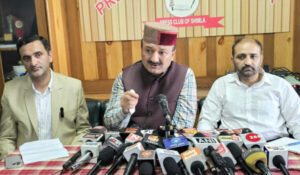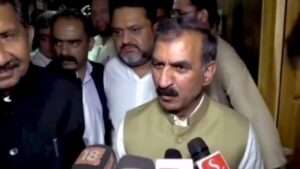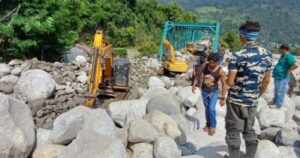Pakistan’s Poor Economy and Crisis 2023 ?
- What is happening in Pakistan
- What went wrong for Pakistan?
- How is the world reacting to the same
- Prospects for the nation.
- What is happening in Pakistan
- It is imperative to note that the economy of Pakistan has been grappling with notable difficulties in the recent past. The nation has encountered considerable difficulties in the form of elevated inflation rates, a substantial trade deficit, and a burgeoning debt load.
- It is a matter of great concern that Pakistan imports a far greater amount of goods in comparison to its exports. According to data from the Pakistan Bureau of Statistics (PBS), the trade deficit of the country was recorded to be $32.6 billion in the fiscal year 2019-20. This has placed a heavy burden on the nation’s foreign exchange reserves. The resulting constraints on the government’s financial capacity have made it challenging for it to fulfil its economic obligations and have also impeded the competitiveness of local businesses in the global market.
- Recently, global reports have shown that the Pakistani government is left with less than a week’s forex reserves.
- It is a matter of grave concern that the rate of inflation in certain regions of the country has risen to an alarming level of over 25%, whereas it typically ranges between 4-6%.
- It is a matter of great concern that Pakistan’s foreign debt is estimated to be approximately $5.8 Bn, and the situation is further exacerbated by the fact that the country has inadequate foreign exchange reserves to repay the said debt.
- According to data from the State Bank of Pakistan, the government’s debt-to-GDP ratio has risen from 64.5% in 2015 to 84.2% in 2019, this increase in debt burden has hindered the government’s ability to invest in crucial projects such as infrastructure development and education which are essential for long-term economic growth.
- Furthermore, it is noteworthy that recently, there was a widespread shutdown of the national electricity grid in Pakistan, which resulted in a chaotic and panicked situation throughout the country.
- What went wrong for Pakistan?
- The period from June to August proved to be particularly dire for Pakistan, with the occurrence of devastating floods in major agricultural regions of the country. Coupled with the already struggling economy, it has made the situation even more challenging.
- The situation further deteriorated as the supply chains were affected due to the Russia-Ukraine Conflict, disrupting the import of essential commodities for the nation.
- Furthermore, the global reputation of Pakistan was being compromised among global banking and loan-giving agencies and organizations such as the World Bank, IMF(International Monetary Funds), ASEAN(Association for South East Asian Nations) and many others, because Pakistan was being placed on the Grey List of the Financial Action Task Force (FATF). This has made it increasingly difficult for Pakistan to obtain loans from these agencies.
- Moreover, seeking loans at high-interest rates from China has led Pakistan to fall into the worst debt trap situation in its history.
- The economy of Pakistan, which was already recovering from the COVID-19 pandemic, was further impacted by the onset of devastating floods, which broke the backbone of the nation’s economy, Agriculture.
- Additionally, sharing its borders with Afghanistan and the escalating situation there has made Pakistan invest heavily in military aspects, thereby draining its financial assets.
- Another major challenge facing the Pakistani economy is the country’s large trade deficit. According to data from the Pakistan Bureau of Statistics (PBS), Pakistan imports far more goods than it exports, with a trade deficit of $32.6 billion in 2019-20. This has put a strain on the country’s foreign exchange reserves, making it difficult for the government to meet its financial obligations and also making it harder for businesses to compete in the global marketplace.
- Furthermore, the already elevated prices of fuel and food commodities further exacerbated the damage to the economy.
- In addition, the lack of stability in the political structure of the government of Pakistan further contributed to the exacerbation of the situation.
- How is the world reacting to the same
- As a result of these challenges, the Pakistani government has been compelled to seek financial aid from its allies and other agencies.
- With already high levels of inflation, dangerously low forex rates, and natural climate challenges, Pakistan has recently been denied further funds by the International Monetary Fund (IMF).
- On January 9, 2023, the International Conference on Climate Resilient Pakistan (ICCRP) began in Geneva, where Pakistan’s Prime Minister, Shehbaz Sharif, made a desperate plea for assistance. On the sidelines, Pakistani representatives met with officials from the International Monetary Fund (IMF) to discuss the currently stalled Extended Fund Facility (EFF).
- The International Monetary Fund (IMF) released a press statement at the time, stating: “Pakistan is facing a challenging economic environment, with lacklustre growth, elevated inflation, high indebtedness, and a weak external position. This reflects the legacy of uneven and inadequate economic policies in recent years aimed at boosting growth but at the expense of rising vulnerabilities and lingering structural and institutional weaknesses.”
- In situations like these for Pakistan, it is important to consider that shortly, even India might be in a similar situation. With all the neighbouring countries around the Indian Republic beginning to feel the effects of slowing economic growth, whether it be Bangladesh, China, Sri Lanka or Pakistan, it is never a good situation to be in when your neighbours are in a weak economic situation, as the situation might someday affect you as well.
- Pakistan’s Finance Minister Ishaq Dar reportedly appealed to a visiting US delegation to help convince the Washington-based multilateral lender, the International Monetary Fund (IMF), to be more lenient towards Pakistan in restoring the program, according to Dawn newspaper.
- According to reports from local media, Dar stated to those he met with that Pakistan plans to fulfil all its international obligations, and will make severe choices to establish economic stability within the nation.
- The IMF has put forward some very specific and strict demands in front of the Pakistan government for help.-
- Currently, The government of Islamabad is waiting for the outcome of the ninth review of a loan agreement with the IMF signed by the previous administration. The review’s results will determine the release of the next instalment of funding, which has been delayed since September.
- IMF officials have stated their willingness to continue collaboration with Pakistan, but they have emphasized that the country must first fulfil the basic requirements set forth by the IMF.
- According to a report by Geo News, Pakistan faces a significant challenge as it will have to secure new loans of USD 10 billion in the next five months (February-June).
- In light of this, the government has sent out a plea to the IMF to revive the program that has been halted since November.
- Prospects for the nation.
- The government of Pakistan has attempted to address the economic challenges by implementing structural reforms such as cutting subsidies and privatizing state-owned enterprises. However, these efforts have not produced the desired results, and further action is needed to stabilize the Pakistani economy.
- The government of Pakistan should prioritize the development of the agriculture and industry sectors, which have significant potential to contribute to the country’s economy. By investing in modern technologies and infrastructure in the agriculture sector, the government can increase productivity and self-sufficiency in food production. Additionally, promoting the industry sector through policies that attract investment and encourage innovation and exports can help to create jobs and reduce the trade deficit. These efforts can strengthen the country’s economy and improve the livelihoods of its citizens.
- As recommended by the National Austerity Committee, Pakistan is mulling the below-mentioned steps –
- increasing the price of natural gas/electricity
- recovery of plots allocated to military and civil bureaucrats
- paying 15 per cent less salary to MPs
- abolishing discretionary schemes for MPs
- Abolishing discretionary funding to Intel agencies
- turning to prepaid gas/electricity meters
- doing away with allowances given along with salary
- reducing the usage of petrol by 30 per cent at all levels
- imposing a ban on foreign visits
- imposing a complete ban on buying luxury vehicles
- In summary, Pakistan’s economy is currently facing some challenges that require urgent attention. To address these issues, the government must take a comprehensive approach that includes increasing exports, promoting industry and agriculture, and reducing debt. By taking these steps, Pakistan can build a stronger, more sustainable and resilient economy that can withstand future shocks and provide opportunities for growth and development for all its citizens. It is important to note that these actions would require a well-coordinated and sustained effort by the government, private sector, and international partners to achieve the desired results.
FAQ
(Frequently Asked Questions)
Q1: What is causing Pakistan’s economic crisis?
- Pakistan’s economic crisis is caused by a combination of factors, including high inflation, a large trade deficit, and a growing debt burden. Additionally, low foreign currency reserves, political instability, and a lack of structural reforms in key sectors of the economy have also contributed to the current crisis.
Q2: How is the government addressing the economic crisis in Pakistan?
- The government has taken some steps to address the economic crisis, such as seeking financial assistance from international partners and implementing austerity measures. However, more comprehensive and sustained efforts are needed to put the economy back on track.
Q3: What can be done to improve Pakistan’s economy?
- To improve Pakistan’s economy, the government should focus on increasing exports, promoting industry and agriculture, and reducing debt. Additionally, implementing structural reforms in key sectors, such as power and energy, can also help to create a more conducive environment for economic growth.
Q4: How will the economic crisis affect the general population in Pakistan?
- The economic crisis is likely to have a megathrust population in Pakistan, as it will lead to rising prices and unemployment. The government must take steps to mitigate the impact on the most vulnerable populations and ensure that they have access to essential goods and services.
Q5: Is Pakistan’s economic crisis likely to improve in the near future?
- The economic crisis in Pakistan is likely to continue in the near future shortly and does not take decisive action to address the underlying issues. However, if the government takes comprehensive and sustained efforts to improve exports, promote industry and agriculture, and reduce debt, the economy can be put back on track.
Q6: What is the role of the private sector and international partners in addressing Pakistan’s economic crisis?
- The private sector and international partners can play a critical role in addressing Pakistan’s economic crisis. The private sector can invest in key sectors of the economy and create jobs, while international partners can provide financial assistance and technical expertise to support economic growth and development.

Kumud Sharma is the First Well-Known Female Journalist of the Journalism World of Himachal Pradesh. I am the Founder, Editor in Chief, Managing Director, Promoter of DiaryTimes. As a Female Journalist, With My Experience of More Than Nine Years, I Tell You Every News of Himachal Pradesh From The Ground Level With Absolutely Accurate and Correct Information, Be it the Politics of Himachal Pradesh or the Ground Reality, My Perspective On Every News Will Give You Assurance. I Assure You That Every News of Mine Will Comply With the Expertise and Fact Checking Policy.








